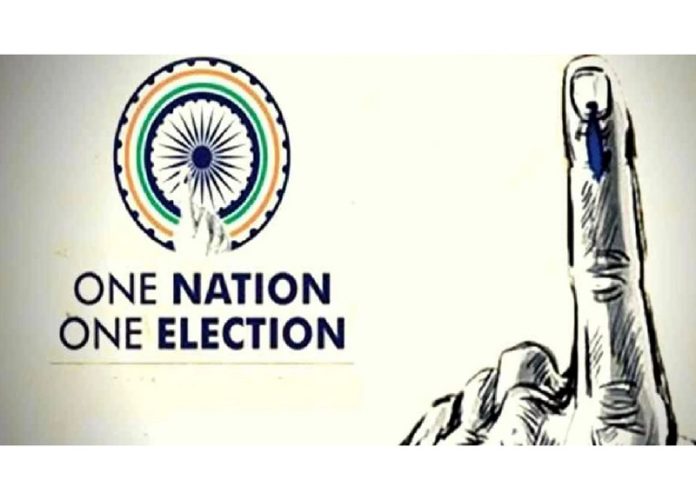NEW DELHI, Jan 8: A robust exchange of contrasting views on Wednesday marked the first meeting of a Parliamentary Panel scrutinising two bills on conducting simultaneous polls, with opposition members criticising the concept as an attack on the basic fabric of the Constitution and federalism, and BJP MPs hailing it as reflective of the popular view.
The MPs attending the meeting of the 39-member Joint Parliamentary Committee expressed their views and asked questions following a presentation by the Ministry of Law and Justice on the provisions of the bills and the rationale guiding them.
A number of opposition MPs, including Congress’ Priyanka Gandhi Vadra, questioned the claim that simultaneous polls will reduce expenditure. They asked if any estimate was made following the 2004 Lok Sabha elections when EVMs were used for the first time in all 543 seats and are believed to have brought down the cost incurred.
BJP MPs, the sources added, countered the charge that the ‘One Nation One Election’ proposal flouted constitutional values by requiring an early dissolution of several State Assemblies and locking their term with the Lok Sabha’s.
Follow the Daily Excelsior channel on WhatsApp
Noting that seven State Assemblies were dissolved early in 1957 to ensure all state elections are held alongside the national elections, Sanjay Jaiswal asked if the likes of then president Rajendra Prasad, who was also the chairman of Constituent Assembly, and other eminent lawmakers, including those in the Nehru Government, acted in violation of the Constitution.
Another BJP MP, V D Sharma, said the idea of simultaneous elections was reflective of the popular will. He also noted that the high-level committee headed by former president Ram Nath Kovind had consulted over 25,000 members of the public, with an overwhelming majority supporting the idea.
The BJP MPs reiterated that a continuous cycle of elections hampers development, the country’s growth and is a drain on the exchequer. One nation one election will be a boost to growth and development, they added.
Shiv Sena, which was represented by Eknath Shinde, cited the case of Maharashtra where Lok Sabha, Assembly, and Local Body polls are held back to back within few months, stressing that this derails development work as the entire State machinery is busy in the conduct of elections.
Several opposition MPs, including those from the Congress, DMK and the Trinamool Congress, echoed their parties’ stated views that the proposed laws run contrary to the Constitution and are attack on its basic fabric as well as federalism.
A TMC MP said upholding people’s democratic rights is more important than saving money.
Some opposition MPs demanded that the Joint Committee of Parliament, headed by former Union Minister P P Chaudhary, scrutinising the two bills should be given a tenure of at least on year due to the enormity of the exercise.
V Vijayasai Reddy of the YSR Congress, which had earlier supported the concept in its submission to the Kovind committee, raised a number of questions over the bills, and demanded that ballot papers must replace Electronic Voting Machines which are is “vulnerable to manipulation”.
Reddy claimed that simultaneous elections will marginalise regional parties, dilute diversity of representations and local issues, undermine the need for elected representatives to engage regularly with voters and turn polls into a contest between two or three national parties.
JD(U) MP Sanjay Jha, sources said, spoke of the incidents of booth capturing in Bihar during the use of ballot papers to refute the suggestion to bring them back.
The BJP ally, however, also raised a few questions, including whether a Government elected for a short tenure will have the required governance focus that a incumbent with five-year term will have.
The bills propose that if a mid-term Lok Sabha or assembly election is held due to the fall of a Government and the absence of any alternative, the tenure of the new legislature will be for the remainder of outgoing House.
All MPs were given a trolley carrying over 18,000 pages, including one volume of the Kovind committee report each in Hindi and English, and 21 volumes of annexure, besides a soft copy as well.
The Constitution (129th Amendment) Bill and the Union Territories Laws (Amendment) Bill were introduced in the Lok Sabha during the recent Winter Session and referred to the committee.
The Government decided to increase the committee’s strength from 31 to 39, as more political parties expressed their desire to be part of the exercise to examine the two draft legislations on simultaneous elections.
Former Union Ministers Anurag Thakur, Parshottam Rupala and Manish Tewari, along with several other lawmakers, including Bhartruhari Mahtab, Anil Baluni, Bansuri Swaraj and Sambit Patra, are also members of the committee.
The Panel has 27 members from the Lok Sabha, and 12 from the Rajya Sabha. (PTI)


